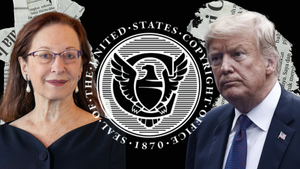President Donald Trump has fired the boss of the US Copyright Office, Shira Perlmutter, shortly after it published its much anticipated report on whether or not training AI models with existing content constitutes ‘fair use’ under American copyright law. If AI training is fair use, AI companies can use existing content within the US without getting permission from any copyright owners.
Some have suggested that publication of the report may have prompted Perlmutter’s dismissal, because it is seen to favour copyright owners over the powerful tech lobby that now surrounds the President - Elon Musk in particular - whose companies want unfettered and free access to all the content in the world to train their AI models.
Democrat Congress member Joe Morelle, who called Perlmutter’s sacking a “brazen, unprecedented power grab with no legal basis”, added, “it is surely no coincidence” that Trump “acted less than a day after she refused to rubber-stamp Elon Musk’s efforts to mine troves of copyrighted works to train AI models”.
However, the timing of the report and Perlmutter’s axing might be connected in another way: the Office knew Perlmutter was about to be sacked and wanted to make sure the AI report was released before that happened.
Somewhat confusingly, the version of the Copyright Office’s AI and fair use report in circulation is called the ‘Pre-Publication Version’.
Pre-publication of government documents is not in itself unusual. Documents are sometimes released as pre-publication versions to give stakeholders a head start on reviewing content, allowing any parties impacted by the report - including companies, industry and advocacy groups, and other government agencies - time to begin preparations for compliance or developing feedback.
The official explanation for why a ‘Pre-Publication Version’ exists of this particular report is that the Copyright Office wanted to respond to queries from Congress and other stakeholders now before publishing the final version of the report later this month.
However, as prominent copyright lawyer and industry commentator Aaron Moss points out, “To be clear, ‘pre-publication versions’ of Copyright Office reports aren’t standard practice. And the timing of this one was no accident”. Moss then states that it is “likely that the Office raced to release the report before a wave of leadership changes could delay - or derail - its conclusions”.
Certainly the release of the pre-publication report seemed to take many people by surprise - coming late on a Friday afternoon with no advance warning.
It seems likely the Copyright Office knew leadership changes were incoming. At least one Conservative lobbying group was already calling on Trump to remove senior officials at the Library Of Congress - of which the Copyright Office is part - because of their perceived left-leaning world-views, rather than because of any debates around copyright and AI.
Plus, Trump had already fired Carla Hayden, the Librarian Of Congress - and the woman who had appointed Perlmutter - late on Thursday evening.
So it’s definitely possible that the Copyright Office rush-released the Pre-Publication Version of its report once it became clear that Trump was about to wield the axe again, with speculation that some Congressional members wanted the report to be made public before Trump allies took over at the Library Of Congress.
Whether or not the pre-publication report will survive to become an official document is not yet clear, the new leadership at the Copyright Office - once appointed - could as yet rescind it.
Trump’s team are working on their own report on AI which will include a section on copyright matters, and it’s been widely speculated that that report will favour the AI companies, given the tech giants are now fully signed up members of the Trump Suck Up Club. The people writing that report may not want official Copyright Office guidance contradicting their conclusions.
That said, the Copyright Office’s ultimate conclusion on whether or not AI training is fair use is basically “maybe, but not always”. Which means - while the report arguably favours the copyright owners - it doesn’t come down strongly on either side of the debate.
That fact is noted by Meredith Rose of Public Knowledge, which campaigns on internet and intellectual property matters. Responding to Morelle’s statement suggesting that the AI report prompted Perlmutter’s sacking, she wrote on social media, “I’m not sold on the causality implied in this statement, because the report is 113 pages of ‘well, it depends!’ and the people who find that offensive enough to call for her ouster would have to be utter lunatics - on EITHER side of this fight”.

